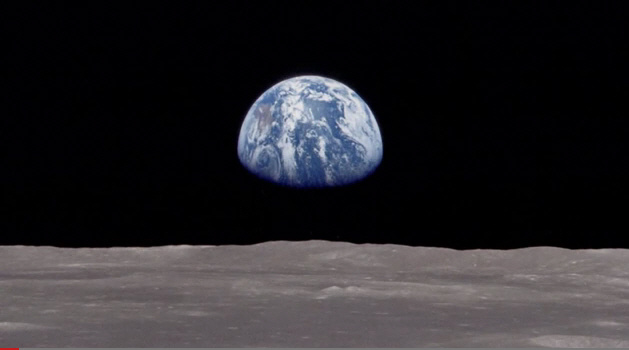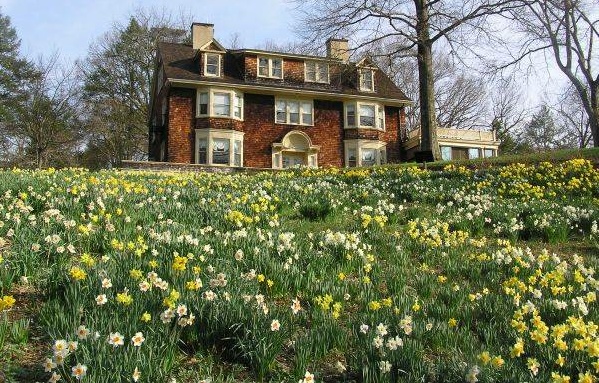
|
Ecological Gratitude – Earth Day 2013
By Marian Glenn
April 21, 2013
Psalm 65: 9-13
[ Audio
(mp3, 5.5Mb) ]
|

|
t me start by thanking Nancy Davies for sharing her vision of an Earth Day worship service, and our senior ministers for orchestrating all the parts. And Frank Bolden for standing here a few months ago to deliver his very inspiring guest sermon, which was a great model to have as I composed this talk.
Also, I'd like to thank the Williams family,
wherever they may be. Their lovely
stained glass window here at Christ Church features St. Francis of Assisi, the patron
saint of ecologists. My favorite story
is about St. Francis talking calmly to brother wolf, who then ceased,
terrorizing the village of Gubbio. This
morning, given
the events of the past week, St. Francis's prayer: “make me an instrument of your
peace,” is just about perfect.

In our window Francis is also conversing with
a deer, and a rabbit. The thought
occurred to me, let's ask St. Francis to do something about
the deer and the rabbits that are ravaging our yards and gardens. These wild brothers and sisters are ruining
the ecology. So just what IS ecology?
The root of ecology
is the Greek word, oikos, meaning household. The same root as economy, and also
the root for Ecumen, like Ecumenical, the whole
community.
The book of Genesis tells us that our human community,
living and dead, is
all one big family, and that each one of us carries forward the responsibility
given by God to Adam and Eve, to care for God's gift, the Earth. Earth is our household, our community. Oikos.
God's charge to Adam and Eve, to be home-makers on
Earth, has been interpreted in various ways, and today's theologians generally
read it as “stewardship.” Our human
family has a precious legacy to protect, to keep the household in order, to
pass along to the next generation, on and on.
So, how are we doing at keeping house on this Earth
that was given to us? Until very recently,
people took God's command, ”fill the Earth and subdue
it,[1]”
at face value, and for a very long time most of the Earth was a fearsome wilderness. But
today, the Earth has been subdued: human
activities are using up earth's resources faster than they can be regenerated, and
each year we are falling deeper and deeper into ecological debt.
Anthropologists tell us that our human species has
been around about 240 thousand years. We
can imagine it as a 24 hour day, with each hour as 10,000 years. Starting at midnight, with everyone living in
Africa, all night, all day, until 6 o'clock in the evening, when a few people
leave Africa and began to fill the rest of the Earth. Time passes, and about 10 minutes before 11
pm our ancestors invented agriculture. Half
an hour later they invented writing, so all of recorded history took place
in the last 40 minutes. At 15 minutes
before midnight, Buddha and Confucius came along, a few minutes later, in one
of the world's perennial trouble spots, Jesus brought
his message to love your enemies. A few
minutes later, Mohammad was born, spreading his message of compassion. During the one minute before midnight, about
150 years, our
human family grew from one billion to 7 billion. And in the last 20 seconds , about 50 years, we
used up more of Earth's resources and
fuel than in all previous human history.
But this is not spread out evenly within our human
family. In the industrial economies it
is considered normal to consume 30 times the resources and produce 30 times the
waste as those living in non-industrialized places. In the last fraction of a second we have seen
how much harm we are causing, and, like those scenes with a car speeding across
the landscape, we are about to go over the cliff.
Although the Bible was written long
before human activities posed a threat of global ecological collapse, many
activists are looking to the spiritual power of religion as the only force
strong enough to avert this apocalypse. And even if the doom-sayers
turn out to be false prophets, the sad state of the Earth already at hand, calls
for a spiritual approach to address the widespread suffering and despair that
fills the world and subdues it.
Joanna Macy is an activist scholar of religion. She sees us headed for the cliff – the
financial cliff, and the ecological cliff. Many weird things have thrown us off balance, financial disruption, dangerous
weather, new deadly diseases, toxic chemicals in our water, our air, and in our
bodies. The thought may cross your mind
that we are facing an apocalypse of Biblical proportions. Joanna Macy has been giving workshops for
decades to support what she calls The Great Turning.
Joanna Macy observes us from the vantage point of an
83 year old wise woman. She sees us racing
around. She sees us measuring the success of our economy by how fast it is
growing. She says, with a calm
logic: “For an economy to grow from year to year,
more needs to be accomplished in the same amount of time… And because the value
of speed is so embedded in our society, most people end up feeling so rushed
and so short of time that their life becomes one long race.“
She describes five consequences from racing around[2].
1. We
don't see disasters coming our way. The
Titanic was moving so fast that when the iceberg was spotted, it was only 37
sec until the ship crashed into it.
2. We
export problems into the future – economists call this externalizing
costs. It makes things cheaper, but leaves behind a
debt, and society in general pays for it later. Like the Carbon dioxide from burning fossil fuels, creating a dangerous
disruption to Earth's climate system, that people will be dealing with for the
next century or more.
3. Dashing
around diminishes the meaning and purpose of our lives. We don't get time to think about what really
matters, when our life is dominated by urgent demands. To grow a project fruitful enough to be
inspiring, takes patience.
4. To
give ourselves a break, we retreat into some comforting activity that brings
short-term relief, but also undermines our motivation to act for a larger
cause.
5. Short
term benefits outweigh long term costs: think addiction.
What
should we do? Joanna Macy recommends that we recognize the
important function that guilt can serve, and to honor this emotion as an awareness that our actions are out of step with our
values. If we, collectively, don't
experience guilt for what we are inflicting on future generations, we are in danger
of pulling a Bernie Madoff environmental Ponzi
scheme. The beautiful world we are
entrusted to protect will be all used up in our lifetime.
The
economy has already crashed, the ecology is deteriorating, and the ecumen, the human community, is deeply divided and
antagonistic. We may not speak about it
much, but there is a lot of anxiety that business as usual has come unraveled,
and we're worried or angry about this “new normal.” Face it, we are
failing as stewards of the Earth.
What should we do? Joanna Macy calls it the work that
reconnects. She says,
begin by expressing the despair we feel about the future. But also think about the vaster story of our family,
our home, our planet Earth, and become attentive to the hosts of ancestors and
the crowd of descendants who are surrounding us, like a cloud of witnesses, and
let their presence give meaning and purpose to even our most ordinary acts -- as
we wash dishes, prepare meals, wait in traffic, take out the trash. We are connected
in many ways with our ancestors and our descendants. Each one of us is an intrinsic part of a long
history, and in this story, each of us has a role to play. Tradition tells us that our actions and our decisions
will reverberate out to the 7th generation.
The work that
reconnects generates that zest for life that gets knocked out by anxiety. We may think that we can stand apart, hook up
our generator, double the house insurance, and avoid the cliff. But more and more, we find that we ARE all
connected in one big, crazy family all scrambling to find our way along the
edge of the cliff-face. We need each other, we need mutual support, to have any hope of achieving
The Great Turning.
To conclude this Earth Day homily, I'd like you to think about home-making on
planet Earth while watching some photos on the big screen. (Click picture below or this link:
http://youtu.be/Ib43UNrcwYo).